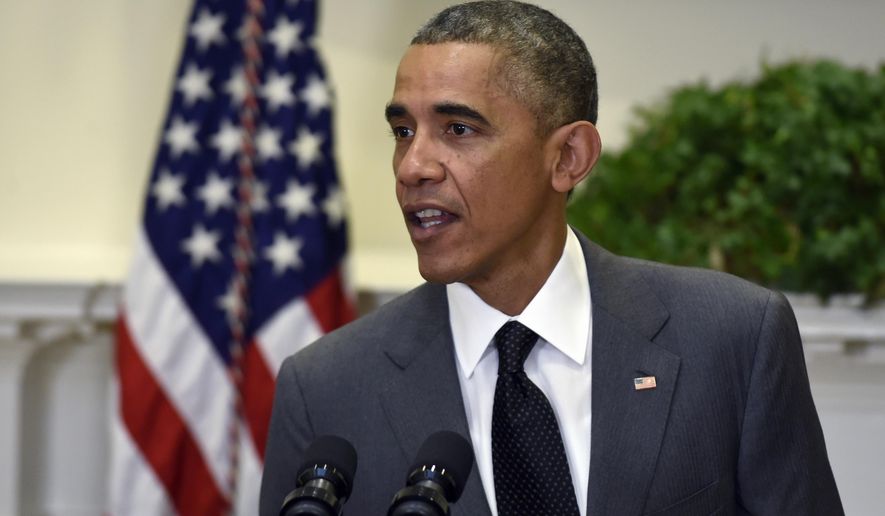President Obama vowed Sunday to move forward with an executive order to ease immigration laws before the end of the year, ignoring dire warnings from Republican leaders that the move will poison his relationship with the next Congress.
The president said he would not wait any longer to address the country’s immigration problems and would grant legal status to most of the estimated 11 million undocumented residents living in the U.S.
“I’d prefer, and still prefer, to see it done through Congress. But every day that I wait, we’re misallocating resources, we’re deporting people that shouldn’t be deported, we’re not deporting folks that are dangerous and need to be deported,” Mr. Obama said in an interview aired Sunday on the CBS program “Face the Nation.”
Mr. Obama has been warned against acting unilaterally on immigration by House Speaker John A. Boehner, Ohio Republican, and Senate Minority Leader Mitch McConnell of Kentucky, who is likely to become majority leader when Republicans take over the upper chamber in January.
Sen. John Barrasso, Wyoming Republican, said the president’s executive action on immigration would be like tossing a “hand grenade” into his negotiations with the Republican-run Congress.
“It would be like the president pulling the pin out of a hand grenade and throwing it in as we are trying to actually work together. I am hoping that cooler heads at the White House can prevail,” he said on “Fox News Sunday.”
The fight over immigration reform adds to the drama when Congress resumes this week after a wave of Republican victories over Democrats in midterm elections. Lawmakers will wrestle with the budget, tax measures and whether to take up Mr. Obama’s nomination of New York federal prosecutor Loretta Lynch to be the next attorney general.
Mr. Obama said he took responsibility for Democrats’ widespread losses in the elections, which Republicans succeeded in making a referendum on the president’s job performance.
“We got beat,” said Mr. Obama. “The buck stops right here, at my desk. And so whenever, as the head of the party, it doesn’t do well, I’ve got to take responsibility for it.”
Despite a slow but steady economic recovery, Mr. Obama said, many Americans are still struggling and are angry about partisan paralysis in Washington.
“We’re making progress, but people still feel like their wages haven’t gone up, their incomes haven’t gone up, it’s still hard to save for retirement, still hard to send a kid to college. And then they see Washington gridlocked, and they’re frustrated,” he said. “They know one person in Washington, and that’s the president of the United States. So I’ve got to make this city work better for them.”
More troops to Iraq?
In the lame-duck session, lawmakers also will consider Mr. Obama’s request of $5.6 billion to fight the Islamic State terrorist army, including $1.6 billion associated with a U.S. military buildup to train and equip Iraqi forces.
He wouldn’t rule out sending even more troops to Iraq after ordering the deployment of another 1,500 last week to bring the number of U.S. military advisers to about 3,100.
Mr. Obama stressed that U.S. troops would be training and supporting Iraqi and Sunni tribal forces, but would not be engaging in combat operations. He said a well-trained Iraqi force is the key to defeating the terrorists.
“What we learned from the previous engagement in Iraq is that our military’s always the best. We can always knock out — knock back any threat. But then when we leave, that threat comes back,” Mr. Obama said.
Critics blame the president’s 2011 withdrawal of U.S. troops from Iraq for creating a power vacuum that has been filled by Sunni extremists.
Executive order
As he risked a brawl with Republican leaders over immigration, the president said that offering legal status and a path to citizenship for illegal immigrants was the only option because “we don’t have the capacity to deport 11 million people.”
“Everybody agrees on that,” he said.
Mr. Obama insisted that his executive order did not have to be the last word on immigration reform. He said Congress still will have an opportunity to pass legislation that could replace whatever executive action he takes.
“What I’m saying to them [is] actually their time hasn’t run out,” said Mr. Obama. “I’m going to do what I can do through executive action. It’s not going to be everything that needs to get done and it will take time to put it in place. In the interim, the minute they pass a bill that address the problems with immigration reform, I will sign it and it supersedes whatever actions I’ve taken.”
“I’m encouraging them to do so,” said Mr. Obama. “They have the ability, the authority, the control to supersede anything I do through my executive authority by simply carrying out their functions over there. And if in fact it’s true that they want to pass a bill — they’ve got good ideas — nobody’s stopping them and the minute they do it and the minute I sign that bill, then what I’ve done goes away.”
However, the president would be able to measure any legislation against his executive orders when deciding whether to sign a bill or exercise his veto power.
In defending his decision to use an executive order, Mr. Obama also cited the need to secure the border, which has been the focus of Republicans in the immigration debate.
Republican lawmakers balked at the Senate-passed immigration bill because they were skeptical of Mr. Obama’s commitment to border security to stop the flood of illegal immigrants if the U.S. opens a path to citizenship.
• S.A. Miller can be reached at smiller@washingtontimes.com.




Please read our comment policy before commenting.